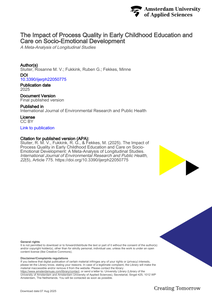We investigated the relationship between process quality in early childhood education and care (ECEC) and children’s socio-emotional development in a meta-analysis of longitudinal studies. Our multi-level meta-analysis of 31 publications reporting on 16 longitudinal studies (N = 17,913 children, age: 2.5–18 yrs) demonstrates that the process quality of ECEC is a small but significant predictor of children’s socio-emotional development over time (ES = 0.103, SE = 0.026, p < 0.001, 95% CI: 0.052–0.155). This longitudinal association extends to the age of 18 years in our sample. Process quality of ECEC is, thus, a significant and stable predictor of children’s socio-emotional development and well-being from toddlerhood to adolescence. The longitudinal relationship was moderated by the type of care (center-based vs. home-based) and the informant (parent, professional caregiver, external assessor, or self-report of the child). Implications for future ECEC research are discussed.
MULTIFILE

BackgroundInterventions to prevent overweight and obesity in toddlers are needed to minimize health inequalities, especially in migration and lower socio-economic groups. Preschools are identified as important environments for interventions to prevent overweight and obesity. Early Childhood Education and Care (ECEC) teachers in preschools are potential key actors in promoting healthy eating and physical activity. This paper describes the research design of a Dutch preschool-based intervention for ECEC teachers in promoting healthy eating and physical activity in toddlers.MethodsPreSchool@HealthyWeight concerns a cluster randomized controlled trial on preschools in Amsterdam Nieuw-West, Netherlands. This city district is characterised by inhabitants with a migration background and low socio-economic status. Forty-one preschools, with 115 ECEC teachers and 249 toddlers/parents, were randomly allocated to an intervention or control group. An intervention for teachers will be carried out on intervention locations and consists of modified versions of 2 existing programs: ‘A Healthy Start’ and ‘PLAYgrounds’. In ‘A Healthy Start’, ECEC teachers learn to provide a healthy and active environment for toddlers. The ‘PLAYgrounds for Toddlers’ program, coaches ECEC teachers to stimulate physical activity in the playgrounds of preschools. PreSchool@HealthyWeight aims to evaluate the effectiveness of the intervention after 9 months. Primary outcomes are the teachers’ knowledge, attitude and practices concerning healthy eating and physical activity, and consequently the level of confidence of ECEC teachers in promoting healthy eating and physical activity in toddlers. Secondary outcomes include the Body Mass Index, body composition, dietary intake and physical activity level of teachers and toddlers. In addition, the activating role of ECEC teachers and the physical activity of toddlers on the playgrounds will be evaluated. Lastly, the knowledge, attitude and practices of parents concerning healthy eating and physical activity will be assessed.DiscussionIt is hypothesized that this preschool-based intervention for ECEC teachers improves the knowledge, attitude and practices regarding healthy eating and physical activity, and consequently the level of confidence of ECEC teachers in promoting healthy eating and physical activity of toddlers. The intervention addresses the call for early intervention to prevent overweight and obesity and to minimize health inequalities.Trial registrationNetherlands Trial Register (NTR): NL5850. Date registered: August 26, 2016.
DOCUMENT

International field visits aim to provide transformative learning experiences that stimulate the professional development of staff, but outcomes may vary among programs. In this mixed-methods study, we investigated the transformative learning experiences of Dutch and German professionals (n = 28) from early childhood education and care (ECEC) who participated in a blended intensive exchange program with mutual field visits. Our findings indicate a transformative learning process in which the participants developed an awareness of cultural differences, moved to understanding these differences and, occasionally, to adaptation of new professional beliefs related to the interaction with young children. However, it proved difficult to implement new practices in the own centers after the program. We discuss how international exchange programs may foster transformative learning and the professional development of ECEC staff.
DOCUMENT
